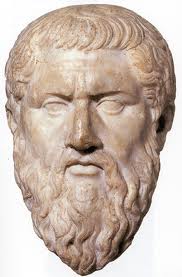Emperor Justinian
Plato *
Plato (c. 428-347 BC) came from an aristocratic family; his father, Ariston, was descended from the early kings of Athens and his mother, Perictione, was related to the renowned Solon, who was to play a major role in the Atlantis story. In turn, Solon’s ancestry is traced back to Poseidon. Furthermore, classical Greek mythology has claims of a virgin birth for Plato(c)!
Plato and his elder brother, Glaucon, were students of Socrates until the latter’s  death in 399 BC at the hands of the Athenian authorities. After Socrates’ demise, Plato travelled extensively, including visits to Egypt and Sicily.
death in 399 BC at the hands of the Athenian authorities. After Socrates’ demise, Plato travelled extensively, including visits to Egypt and Sicily.
While in Sicily he angered the king, Dionysios, who had him seized and brought to the island of Aegina to be sold as a slave, but fortunately Plato was recognised by a fellow Athenian, who bought his freedom and sent him home.
After returning to Athens in 387 BC Plato founded the Academy, a school of science and philosophy, that was to become the model for the university of today. The Academy lasted nearly a thousand years until Emperor Justinian closed it in 529 AD. Perhaps the most famous student of the Academy was Aristotle whose teachings have had a tremendous impact on philosophy right up to the present.
Although many of Plato’s works have survived, we do not have any original Greek texts but are limited to Greek translations of Latin translations of earlier Greek transcriptions, now lost. His extant writings are in the form of letters and dialogues, of which The Republic is considered the most famous. It is two of his dialogues, Timaeus and Critias that contain the earliest unambiguous references to Atlantis.
It is interesting that in a paper(d) by Jean-Luc Solère he noted that “Plato has pointed out the dangers of written works. In his Seventh Letter, he states that he never himself wrote in ‘the sublime questions of philosophy’ (341B-D )and that no serious man will seriously write on serious problems, because he would so lay his thought open to the misunderstanding of the crowd(344B).” Prescient?
June 2010 saw Dr Jay Kennedy, a science historian at the University of Manchester, announce(b) that he had discovered a hidden code in the writings of Plato. “It is a long and exciting story, but basically I cracked the code. I have shown rigorously that the books do contain codes and symbols and that unraveling them reveals the hidden philosophy of Plato. This is a true discovery, not simply reinterpretation.” Kennedy’s findings were published in US journal Apeiron and “reveal that Plato used a regular pattern of symbols, inherited from the ancient followers of Pythagoras, to give his books a musical structure. A century earlier, Pythagoras had declared that the planets and stars made an inaudible music, a ‘harmony of the spheres’. Plato imitated this hidden music in his books.” An more recent (2021) review of Kennedy’s paper is also available(e).
In the opinion of many, Saint Augustine plagiarised some of Plato’s philosophical concepts, effectively ‘Christianising’ him posthumously.
An extensive bibliography of publications relating to all of Plato’s work is available on the Internet(a).
Sadly, Plato’s grave, reputed to have been situated in the grounds of his Academy, has not been located.
However, in April 2024 it was reported that “Italian researchers from the University of Pisa say that they may have identified the burial site of ancient Greek philosopher Plato, potentially ending a centuries-old mystery.
Using advanced technology to analyze texts from the ancient library at Villa of the Papyri, researchers have uncovered previously unknown information about Plato’s life and burial in the city of Athens.” (f)
(a) https://platosociety.org/plato-bibliography/
(b) Science historian cracks “the Plato code” (archive.org) *
(c) Origen, Against Celsus, Book 1, Chapter 37.
(d) https://dlib.bc.edu/islandora/object/bc-ir:100270/datastream/PDF/view
(e) Secret Plato Code Discovered and Solved Claims Historian (greekreporter.com)
(f) Italian Research Team Claims They May Have Found Plato’s Tomb (allthatsinteresting.com)
